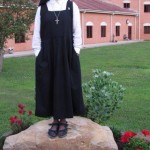
When Buster was pretty small, perhaps three or four years old, a priest asked a rhetorical question during his homily–I don’t remember the question; it might have been “why are we here, today” or something like that–but the boy was determined to answer it, and his hand shot up and remained there, like one long skinny flagpole wavering, while the priest tried to ignore him.
After a while, Fr. Patient–who had baptized Buster and knew him well–sighed and said, “okay, Buster, what’s your answer?”
Sadly, by that time Buster had become more interested in his appendage than in anything else. He smiled at the priest and said, “I have orangutan arms!”
At least the pope didn’t have to endure that.
I’m writing against two deadlines right now, but wanted to direct you toward some pretty remarkable stuff you’ll want to read.
First up, don’t miss Marcia Morrissey’s latest column. In this season of gratitude and the ponderings of Advent, she writes about the way our lives seem to arc in a perfect trajectory, if we really look at things and how they work out. There are a lot of valuable lessons in her piece.
Then, let me introduce you to a writer whose work I just love: he is charming, smart and insightful, and he doesn’t see things the way the rest of us do: check out Joseph Susanka’s Through a Lens, Darkly.
There are few writers who have written so clearly or so well about the art of cinematic interpretation as has that charmingly blunt hillbilly Thomist, Mary Flannery O’Connor.
It might seem counter-intuitive to search for insights on understanding film among the essays and lectures of a fiction writer — and a short-story writer, at that. But in her essay, “The Grotesque in Southern Fiction,” O’Connor reminds her fellow authors (and storytelling artists of any stripe) of an incredibly important insight regarding story and its motivations — an insight they would do well to keep in mind, no matter what their medium.
“that charmingly blunt hillbilly Thomist…” I think O’ Connor would have adored that. I certainly do.
Heather King: Her blog is rapidly becoming a daily must-read for me! Today, Advent; Work and Life of Kenzaburo Oe:
Back in 1963, Ōe’s wife, Yukari, was pregnant. Doctors advised the couple that the baby would be severely developmentally and physically disabled, and urged them to abort. They chose otherwise, and their son Hikari was born. He was visually impaired, epileptic, and possibly autistic. He did not speak.
For a writer, a more unpromising son that Hikari could scarcely have been imagined. This is no sentimental, faux-tender call to pretend we adore the handicapped. We would not adore them nearly so much if we had to live with and take care of them. Ōe has written of Hikari’s abysmal oral hygeine, his bad breath, his immovable bulk, the years of laboriously accompanying him to the special school via bus and train–hours that could have been spent writing, producing–and then the same trip again in the afternoon to fetch him back.
Read this entire, fascinating, moving piece.
If your heart can take it: Now read “Where’s Molly?”
Put on the religious breaks for the political: Bookworm on the Wikileaks
An Advent challenge, of sorts: I was Ignorant and You Taught Me
The question they never ask Buddhists: Does Celibacy Still Have Value?
I like this piece by Ross Douthat. A lot..
The Hitchens/Blair Debate: Austen Ivereigh asks why Tony Blair did not defend the church’s record. I certainly agree that Blair’s Catholicism seems “to permeate none of his thinking.”
Gallileo: The Astronomer’s Faith
In depth Eric Hoffer
A new Habit of Witness entry. More on that, anon!
OSV: Vatican Flubs Media Relations
Back on Politics and Wikileaks: Spengler. Scathing. Some might say “way harsh.” Made me wince.
Also leaked: CIA did not expect a Pope Benedict XVI:
I wonder if I want to stay away from politics altogether during Advent.











